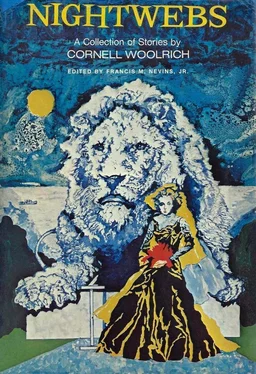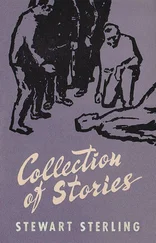He took a pencil from the tremulous waiter and gashed a number of items down the line in rapid succession. “This, and this, and this!” he ordered. “And I want it up here inside of five minutes, get me?”
“Yes, senor. How many places does the senor want laid out?”
“Count ’em out there as you leave,” said Jones gruffly. “They’re all there, the sponges. They wouldn’t miss a free feed.”
“Yes sen—”
“Say senor once more,” Jones shouted, “and I’ll throw something at you!”
The waiter got out fast.
When three short tables had been brought into the outside room, placed end to end to make one long narrow one, and covered over with linen, dishes, glassware, and long thin loaves of Spanish bread Jones entered from the bedroom like a lord, dinner-jacket skintight across his broad shoulders, white handkerchief arrow-heading up out of his breast-pocket, white kid gloves on his hands once more. He ate in them, too.
“Evening, everybody,” he said with an air of feudal hospitality.
They all sat down at the table. That was what they had been waiting for, some of them for two hours.
There were eight of them present tonight, not counting Jones. Bill Nichols (trumpet) and girl, Buzz Davis (drums) and girl, “Hot-shot” Henderson (bass trombone) and Roy Daniels (piano), and two unattached girls, that were nobody’s girls, but just there for the food. They’d been coming around for about two weeks now.
With the fish course, a messenger entered the room carrying a small cardboard box.
“For the Senor Maxi,” he announced, “from an admirer.”
Jones opened it and looked inside. There was a single giant-sized white carnation, its stem carefully wrapped in silver paper, a pin for eventual use affixed to it. Also a note on orchid paper.
Jones gave this last to Nunez to read aloud, written Spanish being over his head.
Everyone turned around in their chairs to listen, as though a public speech were being made. Nunez cleared his throat and began to read: “‘I will be there again tonight, just as I am every night. You will see me but you will not know me. But if you will wear my flower in your coat, and if you will play Symphonic for me, you will make me supremely happy.
“(Signed) ‘An aficionada who has not the courage to come closer.’”
“Every night regular, for three weeks now,” Bill Nichols kidded. “Her old man must be in the florist business.”
“Maybe he runs a funeral parlor,” Davis suggested.
Toward the end of the meal, which was signalized by the pouring of boiling-hot coffee into large glasses partly filled with sugar, Nunez, who had been over at the partly open door, conferring with someone unseen on the outside of it, came back to Jones and leaning across his shoulder, whispered:
“There’s a man outside wants to see you, senor.”
“That’s nothing new,“Jones answered patronizingly. “There’s always someone wanting to see me, in this town. Ask him what he wants.”
“I already asked, and he wouldn’t tell me, senor.” Nunez shrugged. “He’s from your own country.”
Jones was suddenly wary. He shook his head.
“Tell him no. Not tonight—”
He stopped and looked. The ineffectively closed door had slowly swung back again and the man was in anyway. The chattering died down, and the others all turned and stared, taken back by this unmistakable piece of lčse-majesté.
He had on a dark-gray suit that could have stood a little pressing. There was a wrinkled topcoat slung over his arm. He carried a well-worn hat, brim slanted down in front. His eyes were blue, his skin-color was on the ruddy side, and his hair was cut down to bristles and sandy-light in shade.
“Close that door and keep—” Jones started to order Nunez, displeased.
But the man did it himself, from the inside now, and then came on slowly. He stopped about four or five feet from Jones’ chair.
“You’re Maxwell Jones,” he said.
“Do I know you?” Jones answered.
“You start tonight.”
“And maybe I finish tonight, too.”
“I wouldn’t count on that. I’d like a little talk with you.”
Jones picked up his coffee-glass, put it to his lips and put it down again, without drinking anything.
Then he touched his napkin to the place the glass had touched.
“I’m eating, can’t you see that?” But he said it a little thinly.
The man didn’t answer; he just stood there waiting.
It was in English so the girls were cut off from the sense of it. But they must have gotten something of its tense, hushed import. None of them moved or spoke. All watched Jones and the stranger.
The man tired of waiting. He broke the silence. “Do you want it in front of all your friends, or do you want it just between the two of us? You can have it either way.” He shifted his topcoat a little higher on his arm.
Jones rose at last.
“Okay,” he said grudgingly. “Come inside.”
“Let’s do that,” the man agreed ironically, and followed him into the bedroom and closed the door.
Jones seated himself on a chair, nervously turning a cigarette around and around in his fingers. The intruder stood there looking down at him. His topcoat had been flung across the top of the dresser, and his hands were sandwiched into the back pockets of his trousers. One of them, on the right, had a peculiar shape through the cloth, like a wedge, ending in a stubby rounded coil of metal. He just kept them there like that, while he talked.
“You’re Maxwell Jones, and you’re thirty-two.”
“And you?” said Jones, with a rapidly evaporating arrogance that was escaping from him like steam and leaving him more wilted by the minute. “Or isn’t this an introduction, maybe?”
“You don’t need my name,” the man said with a half-smile. “One, four, oh, two, one, two. It’s on here.” He took something out of his pocket, the left one, and held it for Jones to see, then put it back.
Jones dropped his cigarette, picked it up, then threw it away for good.
“You’re from a little place outside of Nashville called Liberty.” The man gave that half-smile again. “Most people never heard of it, but you and I have, haven’t we?”
“I’ve never been there in my life,” Jones said haughtily.
“They think you have, and, friend, I just work for them.”
“Who’s they? ” Jones asked. His eyes darted too wide of their mark, then came back center to the other man again.
“Now who do you suppose?” the man said ironically. “Sheriff Carney, the constabulary, just about the whole community, I reckon.”
Jones moistened his lips. “What — what for?”
“They want to talk to you.”
“What about?”
“This and that. About Amy Dwyer, the sheriff’s daughter. About Mark Claybourne, son of the councilman. I guess you know.” He elevated himself a little on the balls of his feet, sank down again on his heels. “They were both murdered, at the same time and place. I guess you know all that. Pretty grim stuff.
“They left a powerful lot of mourners. Influential mourners. Sheriff Carney. Amy was the apple of his eye. Greg Dwyer, her husband. Mark’s wife who’s the daughter of another member of the town council. Those three families, between them, just about own the community.
“It was more than a double killing, really. It was a triple one. Doc Stevens had promised Carney a grandchild — his first. All those people, not just two, were killed in one way or another. Mark’s wife is as good as lying in the grave with him; she’s just a ghost that goes walking around in a woman’s dress.
“Greg Dwyer has to be picked up and carried home most every night from the tavern; and you can tell which way they took him by the alcohol smelling up the air. All those people paying up, for just a moment’s heat run wild.” He looked at Jones bitterly.
Читать дальше












